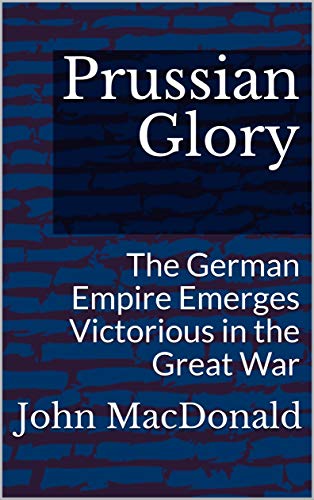Prussian Glory: The German Empire Emerges Victorious in the Great War / John MacDonald
| List Price: | |
| Our Price: | |
|
Used Book Price: | |
| Prussian Glory: The German Empire Emerges Victorious in the Great War / John MacDonald | |
| Publisher: | |
| Availability: | |
| Sales Rank: 71853 | |
Similar Books
“We take Bullecourt, they take Rumania; We take Messines, they take Russia; We don’t take Passchendaele, they take Italy."
-General Henry Wilson to Winston Churchill in 1917
“A still victorious Germany had already obtained a measure of control over Finland and the Baltic provinces, Poland and the Ukraine. She was pressing eastwards along the north of the Black Sea, while her ally, Turkey, was once more advancing along the south, towards the Caucasus and Caspian. If Germany could escape defeat in the World War, it seemed likely that she would emerge with a great extension of her power in the east; with at least a suzerainty over the ring of puppet states she had erected between the Baltic and the Black Sea; with a wide band of controlled territory running to the Caspian, and possibly across Siberia to the Pacific. It was apprehended that the destructive working of Bolshevism might in fact prove merely to have broken up and ploughed a field in readiness for planting with Prussianism."
-David Lloyd George ‘War Memoirs’
If one examined the words spoken and written in confidence by the leading lights of the Entente Powers during the dark days of 1917, what must strike the examiner is the attitude of pessimism and impending defeat. Russia was down in March and then out in November. Italy was handed a tremendous defeat starting in late September at the battle of Caporetto. Mutiny was rampant in the French armies during most of 1917. Insurrections in the British army occurred in Etaples, France in September 1917 and in Sussex, England in early 1918. Clearly the eventual victors were stretched to a breaking point before their fortune changed in August, 1918.
History is written by winners. After both World Wars, the winners chiseled the inevitability of their victories in stone: that industrial output will always vanquish battlefield brilliance in the Industrial Age; in short, the primacy of ‘stuff.’ Not so. Defeat is a sequence of strategic errors by the defeated rather than a decided material advantage of the victorious. The actual outcome of 1918, which unleashed Fascism on the European continent and Communism throughout the world, stretched its 'long shadow' over the 20th century. A victory by the German Empire in 1918 would have strangled Russian Bolshevism in its cradle, not by ineffective and exhausted Anglo-American intervention, but by overwhelming German military power allied with counter-revolutionary 'White Russian' forces, initiated from advantageous geographic position. What alternate destiny was in store for the Russian people we cannot know. But collectivized agriculture, famine, paranoid purges and the scorched earth and depopulation of World War Two were almost certainly not among the options.
But how could Germany and its allies have won the war, handicapped as they were by an ever-widening gap between the food, manpower, and raw materials that were needed to prosecute a winning strategy? I hope by reading 'Prussian Glory' you come away convinced that the formula was within the grasp of Germany’s resources and manpower utilized more judiciously. Her defeat was not inevitable, but instead the result of the Kaiser's egregious dependence on the 'Dictatorship' of Hindenburg and Ludendorff, gifted tacticians at best, who erroneously fixated on the Western Front as the 'Schwerpunkt,' the focal point of victory, when it was anything but.
Now you can buy Books online in USA,UK, India and more than 100 countries.
*Terms and Conditions apply
Disclaimer: All product data on this page belongs to .
.
No guarantees are made as to accuracy of prices and information.
-General Henry Wilson to Winston Churchill in 1917
“A still victorious Germany had already obtained a measure of control over Finland and the Baltic provinces, Poland and the Ukraine. She was pressing eastwards along the north of the Black Sea, while her ally, Turkey, was once more advancing along the south, towards the Caucasus and Caspian. If Germany could escape defeat in the World War, it seemed likely that she would emerge with a great extension of her power in the east; with at least a suzerainty over the ring of puppet states she had erected between the Baltic and the Black Sea; with a wide band of controlled territory running to the Caspian, and possibly across Siberia to the Pacific. It was apprehended that the destructive working of Bolshevism might in fact prove merely to have broken up and ploughed a field in readiness for planting with Prussianism."
-David Lloyd George ‘War Memoirs’
If one examined the words spoken and written in confidence by the leading lights of the Entente Powers during the dark days of 1917, what must strike the examiner is the attitude of pessimism and impending defeat. Russia was down in March and then out in November. Italy was handed a tremendous defeat starting in late September at the battle of Caporetto. Mutiny was rampant in the French armies during most of 1917. Insurrections in the British army occurred in Etaples, France in September 1917 and in Sussex, England in early 1918. Clearly the eventual victors were stretched to a breaking point before their fortune changed in August, 1918.
History is written by winners. After both World Wars, the winners chiseled the inevitability of their victories in stone: that industrial output will always vanquish battlefield brilliance in the Industrial Age; in short, the primacy of ‘stuff.’ Not so. Defeat is a sequence of strategic errors by the defeated rather than a decided material advantage of the victorious. The actual outcome of 1918, which unleashed Fascism on the European continent and Communism throughout the world, stretched its 'long shadow' over the 20th century. A victory by the German Empire in 1918 would have strangled Russian Bolshevism in its cradle, not by ineffective and exhausted Anglo-American intervention, but by overwhelming German military power allied with counter-revolutionary 'White Russian' forces, initiated from advantageous geographic position. What alternate destiny was in store for the Russian people we cannot know. But collectivized agriculture, famine, paranoid purges and the scorched earth and depopulation of World War Two were almost certainly not among the options.
But how could Germany and its allies have won the war, handicapped as they were by an ever-widening gap between the food, manpower, and raw materials that were needed to prosecute a winning strategy? I hope by reading 'Prussian Glory' you come away convinced that the formula was within the grasp of Germany’s resources and manpower utilized more judiciously. Her defeat was not inevitable, but instead the result of the Kaiser's egregious dependence on the 'Dictatorship' of Hindenburg and Ludendorff, gifted tacticians at best, who erroneously fixated on the Western Front as the 'Schwerpunkt,' the focal point of victory, when it was anything but.
Now you can buy Books online in USA,UK, India and more than 100 countries.
*Terms and Conditions apply
Disclaimer: All product data on this page belongs to
 .
.No guarantees are made as to accuracy of prices and information.










